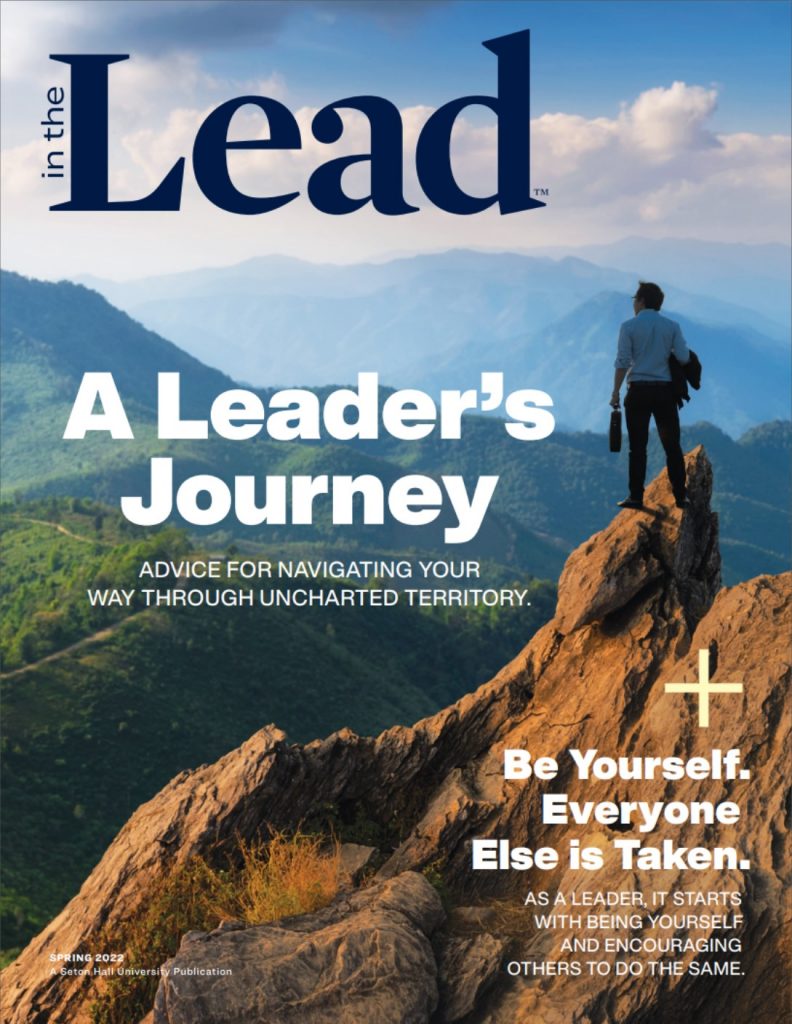In the Lead with is a conversation with an industry leader on key trends and leadership challenges in their industry. In this issue, we present a conversation with Josh Harris, owner of multiple sports franchises, on key leadership trends in the sports industry.
ITL: How would you describe the intensity of disruption in sports? Is disruption a key challenge for sports leaders? If yes, why?
JH: This is an incredibly exciting time to be in the business of sports. Innovation is everywhere, driving disruption in a number of different areas across the industry.
One major driver behind this disruption is the globalization and digitization of media content. Fans, particularly younger viewers, want to watch sports when and how they want to. As a result, they’re “cutting the cord,” relying less on traditional media outlets to consume content. While this trend has been emerging for years, it was accelerated by the pandemic, when people spent more time than ever in front of screens. This shift presents a huge opportunity to deliver content and experiences to fans in new ways — something that is top of mind for all sports leaders.
From a market perspective, we’re seeing unprecedented interest in sports assets, reflected in their valuations and access to expanded capital streams. Companies are emerging in areas like betting and Non-Fungible Tokens (NFTs), which are exploding in popularity. This tells us that there is a real desire to engage with sports in new ways — beyond just tuning in to watch a game.
It’s our responsibility to determine which ideas within the vast universe of opportunities are worth investing in. HBSE Ventures, HBSE’s venture investing arm, does just that — identifies and partners with promising entrepreneurs building the next leading companies in sports tech. At the end of the day, this industry is brimming with entrepreneurs looking to build great companies and it will be interesting to see how things play out over the long-term.
ITL: What in your view are the three top challenges for sports leaders?
JH: First, I believe all sports leaders are focused on creating the strongest franchise possible, and ultimately building winning teams and delivering championships to the cities where they play. To do that, we need to attract, develop and grow the best people — including players, coaches and staff members within our organization. Taking the NBA as an example, there are 30 teams, all competing for top talent. At HBSE, we have always placed a premium on recruiting the best players and hiring the brightest, most driven and forward-thinking individuals to lead our organization. We recently announced that Tad Brown, formerly the CEO of the Houston Rockets, will be HBSE’s next CEO. In Philly, we’ve assembled one of the best front offices in the NBA, led by Daryl Morey, Elton Brand and Doc Rivers. It’s a perpetual challenge that we face, and one we relish — making sure that we have the industry’s most innovative leaders driving our decision-making every day.
The NBA Bubble was a huge success amidst unprecedented circumstances; we had zero cases of COVID and created a framework for how other sports could play safely in this “new normal.”
Second, fan experience is always front and center. At the Sixers and Devils, we have some of the most passionate and dedicated fans in the world. We’re constantly looking for new ways to deliver the best experience to our fans, introducing innovation where possible while maintaining the integrity of the game they love. With sports betting, for example, many of our fans are excited about the second-screen experience during games, but others are not. It’s our job to strike the right balance — working with our fantastic partners to meet the growing demand for betting, but knowing when enough is enough. Basketball is also becoming hugely popular overseas, and we’re excited about the Sixers’ growing international footprint. This is pushing us to think about how to engage our fans on a global scale and deliver the same great experience, regardless of where in the world our fans are.
Lastly, we have a responsibility to act as steward of the cities where our teams operate. Sports are a great unifier and people really look up to these teams. This is what got me into the game, and it’s a responsibility I take seriously — I’ve also found it to be the singular most rewarding aspect of my job. We’re mindful of the fact that the decisions we make as an organization impact not only our players, but the fans and the cities where our teams play. Every day, we try to push the ball forward, doing our best to represent Philly, Camden and Newark, and putting energy and resources into strengthening the communities where our fans live, work and play. There is nothing more important or motivating to us than making our fans proud of the teams they love.
ITL: Can you speak to a recent challenge that you worked through as an organization? Who are the key stakeholders who were involved and how did you collaborate?
JH: I feel extremely lucky to wake up every day and work with an incredible group of people — many of whom I’ve worked alongside for years and count among my closest friends. It’s my responsibility to support our leaders — at the organization, team and community level — to ensure they have the resources they need to succeed, put them in positions where they have agency and empower them to do their jobs to the best of their ability.
The events of the past year are a great example of how we work together as an organization and league, especially through adversity. In the early days of the pandemic, the world missed sports. We wanted to get back up and running, as quickly and safely as possible, to unify people and bring them hope. The NBA is structured as a 50/50 partnership, which means there is an extremely constructive relationship between the players and owners. Led by Adam Silver, owners and players worked closely to come up with a strategy for how to play through lockdown, adhering to the guidance of experts in the medical community. The players were a critical piece of the puzzle, acting as leaders both on and off the court. The NBA Bubble was a huge success amidst unprecedented circumstances; we had zero cases of COVID and created a framework for how other sports could play safely in this “new normal.”
Like the rest of the world, the pandemic was something we had never anticipated. It tested us in unexpected ways, bringing us together and helping us communicate as an organization and league. It has had long-lasting impacts on the way we collaborate, and we are stronger for it, something I consider a silver lining.
ITL: What has been the traditional profile of a leader in the sports industry? How do you see it changing in the future?
JH: While there has always been a responsibility to lead the franchise and act as a fiduciary on behalf of the fans, I think Managing Partners and Governors have a greater responsibility than ever before to act as stewards of the communities where their teams play.
I believe deeply that people in positions of power have an obligation to help those around them. My platform is one of privilege and its critical that I use it to create tangible impact. When the pandemic struck, as an organization, we knew it was incumbent upon us to support the communities where our teams play. We worked with community partners to help in a time of desperate need, providing emergency aid, medical supplies and food, as well as longer-term support like laptops and WiFi to ensure that children could continue their studies and stay connected remotely. This was an extremely difficult time, especially for communities where resources were not as readily available, and we wanted to lean in and use our platform to bring people relief where we could.
In the midst of the pandemic, our country was also facing a reckoning of the systemic racism that exists in our country. The protests were eye-opening for me — I was not as aware as I should have been about the unacceptable magnitude of racial injustice that Black Americans face every day. It was my responsibility not only to educate myself, but to make sure that as an organization, we were taking the necessary steps to combat issues of inequity. I’m proud of actions that the NBA has taken — including establishing the NBA Foundation, dedicated to economic empowerment within the Black community, and the Social Justice Coalition, but this is just the beginning. There is so much more work to be done.
I got into this business because I truly believe sports have the power to unite people, drive change and be a great equalizer. I think everyone has an obligation to do what they can to move the ball forward, starting with our own industry. The NBA, for example, is 75% Black men, but we need to push for more diversity, particularly gender diversity, at the organizational and leadership level. This is table stakes — not only because it is the right thing to do, but because it is critical to the longevity of our industry if we want to continue attracting the best and brightest people.
ITL: What lessons can be learned from leading in the sports industry that are valid universally?
JH: I have always been deeply passionate about sports, since I discovered wrestling at a young age, through to competing at the collegiate level at Penn. Eventually I was able to apply skills from my day job at Apollo to sports. This is very much a labor of love, and I have found that above all, in order to find success, it’s incredibly important to love what you do. We spend far too much time working to not feel fulfilled in our careers. Investing and sports are my passions, so even though this work is extremely challenging, I look forward to it every day and find it incredibly rewarding.
I also think it is critical to surround yourself with like-minded people who share your values and vision for the future. I have a great partner in David Blitzer, and together we have built a strong portfolio of teams and brands within HBSE, but more importantly, an organization full of people whom we trust and care about. People do their best work when they are in a supportive environment, and we continue to make that a top priority.
Finally, we always return to the fact that everything we do is with the cities and the fans we serve in mind. These teams mean so much to so many people. The Sixers and Devils have lifelong supporters, committed through great seasons and disappointing ones. That is what drives our organization forward. I feel extremely fortunate to have a hand in these storied franchises, home to athletes that are advancing the sport, represent the best in athleticism and sportsmanship, and are inspiring the next generation of athletes, as well as creating close-knit communities that transcend city, state and even country borders. These teams have captured the hearts of millions across the globe, and it’s daunting, thrilling and deeply inspiring to be a part of that story.






